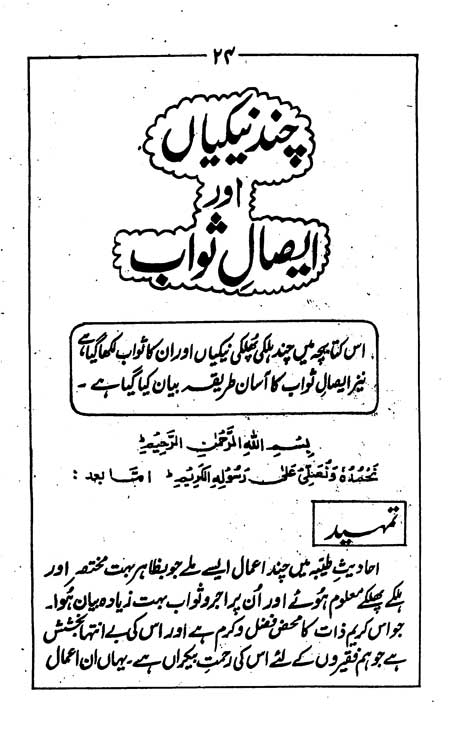
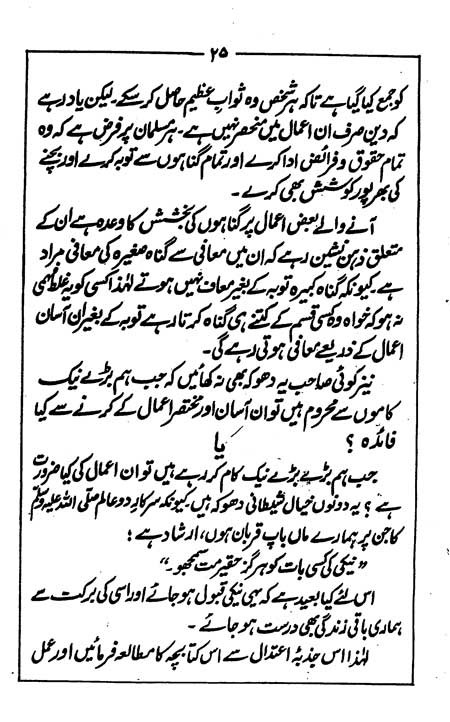
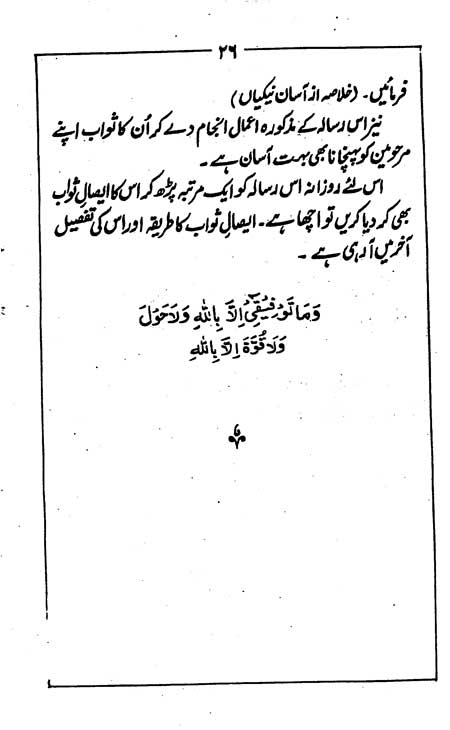
Allah Guides Whom He Wills
[ALLAH’S Quran – 28:56] “You Muhammad shall not be able to guide to Allah’s path whom you like or to whom you have special affection* but Allah guides to His path of righteousness whom He will and He knows best those who are willing to lift to Him their inward sight.”
The Prophet (Peace Be Upon Him) has said:
[Bukhari, Book #58, Hadith #223] “ Narrated Al-Musaiyab: When Abu Talib was on his deathbed, the Prophet went to him while Abu Jahl was sitting beside him. The Prophet said, “O my uncle! Say: None has the right to be worshipped except Allah, an expression I will defend your case with, before Allah.” Abu Jahl and ‘Abdullah bin Umaya said, “O Abu Talib! Will you leave the religion of ‘Abdul Muttalib?” So they kept on saying this to him so that the last statement he said to them (before he died) was: “I am on the religion of ‘Abdul Muttalib.” Then the Prophet said, ” I will keep on asking for Allah’s Forgiveness for you unless I am forbidden to do so.” Then the following Verse was revealed:– “It is not fitting for the Prophet and the believers to ask Allah’s Forgiveness for the pagans, even if they were their near relatives after it has become clear to them that they are the dwellers of the (Hell) Fire.” (9.113) The other Verse was also revealed:– “(O Prophet!) Verily, you guide not whom you like, but Allah guides whom He will …….” (28.56)”
Amal Mukhtasar Sawab Zyada
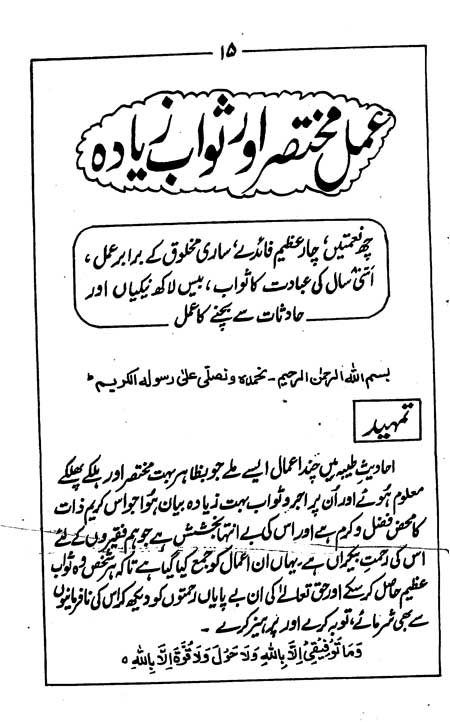
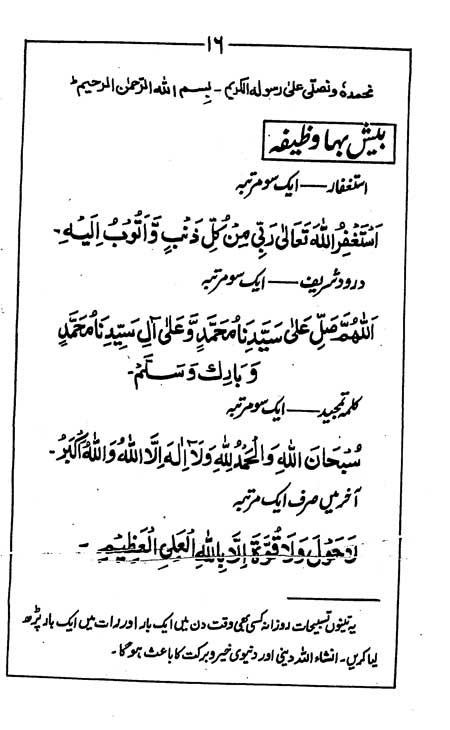
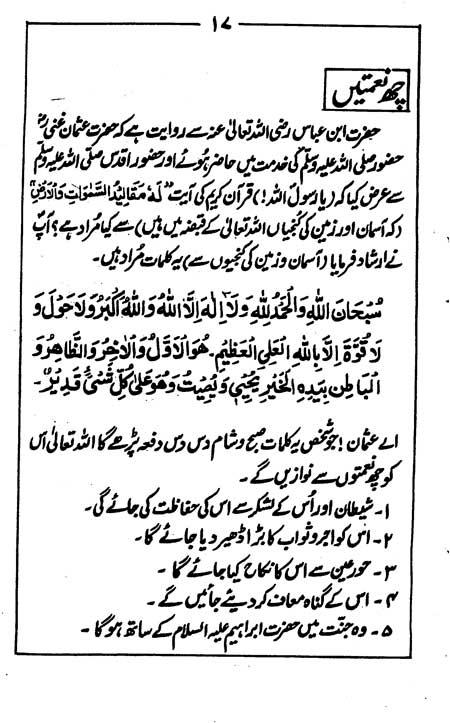
Seal Their Hearts
Abdullah B.Umar and Abu Hurairah said that they heard Allah’s Messenger (Way Peace Be Upon Him) say on the planks of his pulpit:
People most cease to neglect the Friday prayer or Allah will seal their hearts and then they will be among the negligent.
[Book 004, Number 1882: Muslims Shareef]
Jabir B.Samura reported :
I used to pray with the Messenger Of Allah (May Peace Be Upon Him) and both his prayer and sermon were of moderate length.
[Book 004, Number 1883: Muslims Shareef]
Rehmaton Waley Amaal
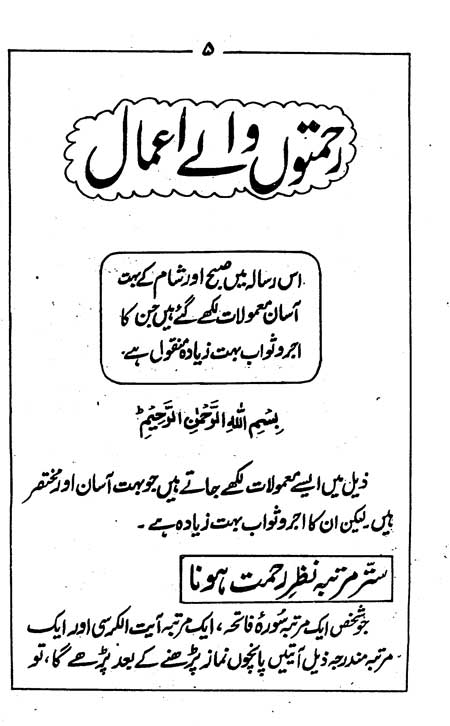
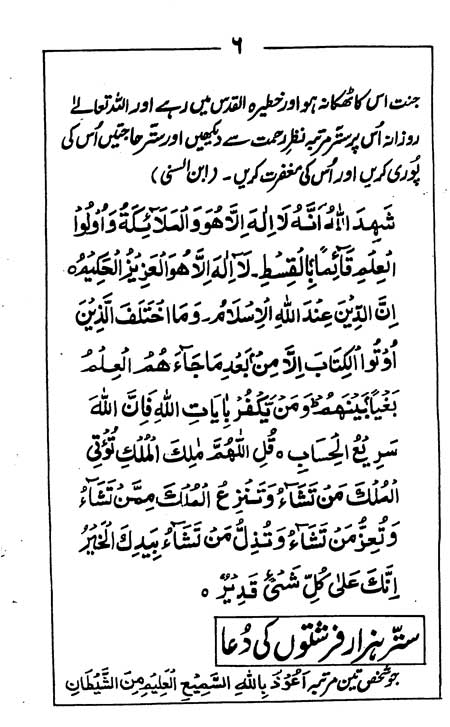
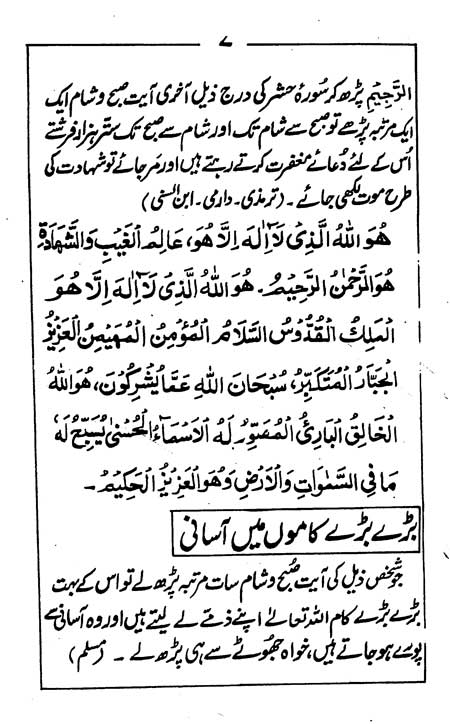
Treatment Of Wives
In light of the Verses of the Qur’an, we see that Allah, the Exalted, ordered excellent treatment towards the wife, generosity towards her, and the best cohabitation with her, even if there is no love from the heart. Allah, the All-Wise said: “And live with them in the best way. If you dislike them, it may be that you dislike a thing and Allah brings through it a great deal of good.” (Surah An-Nisa’, 4:19)
The Prophet (Peace be upon him) said:
“A believer man must not hate (his wife) believing woman; if he dislikes one of her characteristics he will be pleased with another.” (Reported by Muslim)
Also, Allah clarifies that the woman has rights toward her husband, just as the husband has towards her. Allah, the Exalted says:
“And they (women) have rights (over their husbands), similar (to those of their husbands) over them, to what is reasonable.” (Surah Al-Baqarah, 2:228)
And the Prophet’s (Peace be upon him) last will before he dies was that men should take care of their wives and honor them, and never treat them unfairly or swallow their rights. The Prophet (Peace be upon him) said:
“Treat the women in the best way.”
And the Prophet (Peace be upon him) ordered us to behave well to our wives, and be generous with them, and he also clarified that the best of men is he who treats his wife best. The Prophet (Peace be upon him) said:
“The most complete in faith is the best in character. And the best of you is the one who is best to his wife.” (Reported by At-Tirmidhi)
The Prophet (Peace be upon him) also said:
“The best of you is the one who is best to his wife, and I am the best of you to my wives.” (Reported by Ibn Majah)
Also, the Prophet (Peace be upon him) ordered his Companions to endure the mistakes of their women, clarifying the nature of the woman, in which Allah created her. The Prophet (Peace be upon him) said:
“Treat the women in the best way. Verily, the woman was created from a rib and the most crooked portion of the rib is its upper part; if you try to straighten it, it will break, and if you leave it, it will remain crooked, so treat the women in the best way.” (Reported by Al-Bukhari)
The Messenger of Allah (Peace be upon him) also said:
“Verily, the woman was created from a rib. It shall not be straightened to you in any way (i.e. she shall not behave exactly as you wish her to). Thus, if you enjoy her, you will enjoy her bent. And if you tried to straighten her, you would break her. And to break her means a divorce.” (Reported by Mustakhrag Abi ‘Awana)
- February, 23
- 5537
- Human Rights
- More
Subh Aur Shaam Ki Duaain Aur Masnoon Azkaar
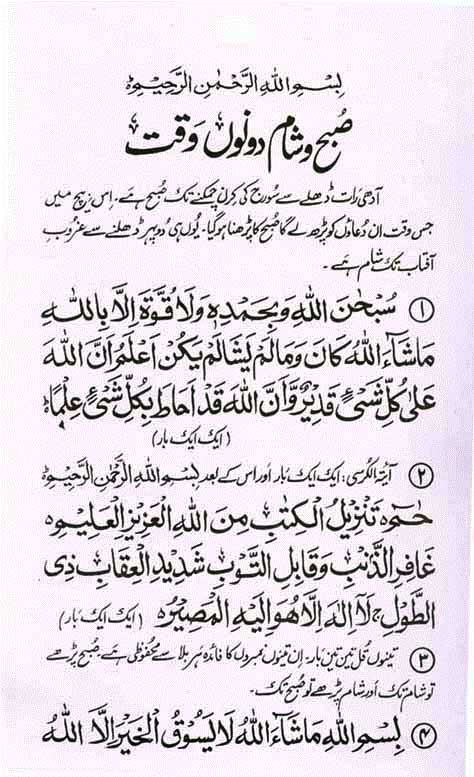
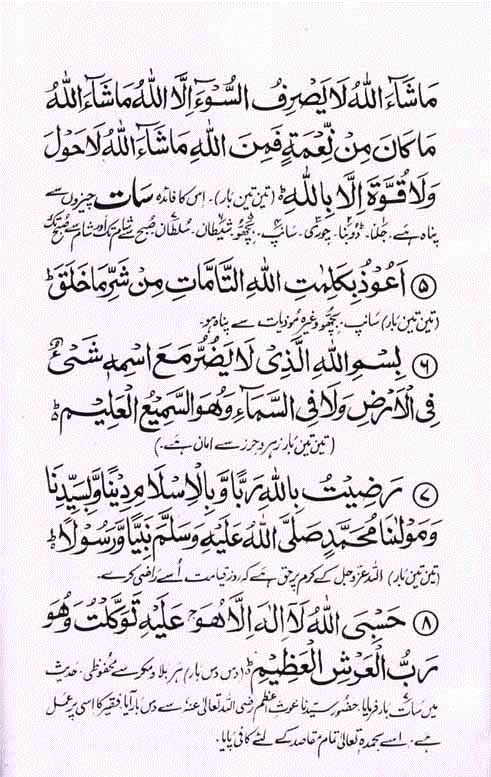
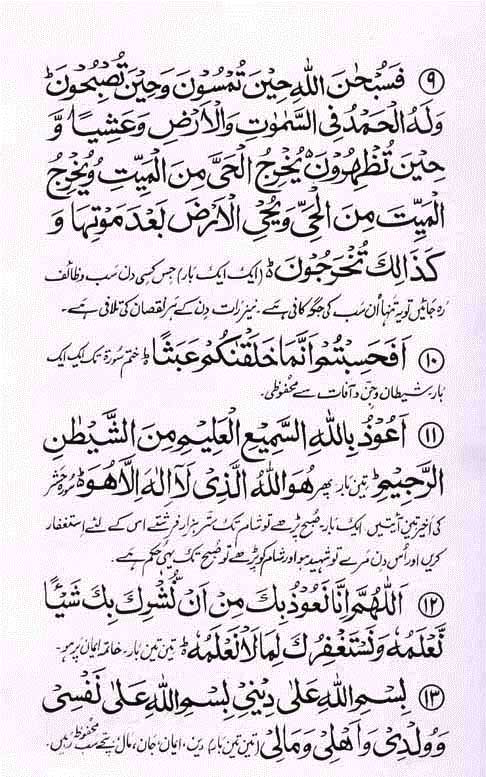
Five Pillars Of Islam
What Are the Five Pillars of Islam?
1) The Testimony of Faith
2) Prayer
3) Giving Zakat (Support of the Needy)
4) Fasting during the Month of Ramadan
5) The Pilgrimage to Makkah
The Five Pillars of Islam are the framework of Muslim life. They are the testimony of faith, prayer, giving zakat (support of the needy), fasting during the month of Ramadan, and the pilgrimage to Makkah once in a lifetime for those who are able.
1) The Testimony of Faith:
The testimony of faith is saying with conviction, “La ilaha illa Allah, Muhammadur rasoolu Allah.” This saying means “There is no true god (deity) but ALLAH, and Muhammad is the Messenger (Prophet) of ALLAH.” The first part, “There is no true god but ALLAH,” means that none has the right to be worshiped but ALLAH alone and that ALLAH has neither partner nor son. This testimony of faith is called the Shahada, a simple formula that should be said with conviction in order to convert to Islam. The testimony of faith is the most important pillar of Islam.
2) Prayer:
Muslims perform five prayers a day. Each prayer does not take more than a few minutes to perform. Prayer in Islam is a direct link between the worshiper and ALLAH. There are no intermediaries between ALLAH and the worshiper.
In prayer, a person feels inner happiness, peace, and comfort, and that ALLAH is pleased with him or her. The Prophet Muhammad (S.A.W.W) said: {Bilal, call (the people) to prayer, let us be comforted by it.} Bilal was one of Muhammad’s (S.A.W.W) companions who was charged to call the people to prayers.
Prayers are performed at dawn, noon, mid-afternoon, sunset, and night. A Muslim may pray almost anywhere, such as in fields, offices, factories, or universities.
3) Giving Zakat (Support of the Needy):
All things belong to ALLAH, and wealth is therefore held by human beings in trust. The original meaning of the word zakat is both ‘purification’ and ‘growth.’ Giving zakat means ‘giving a specified percentage on certain properties to certain classes of needy people.’ The percentage which is due on gold, silver, and cash funds that have reached the amount of about 85 grams of gold and held in possession for one lunar year is two and a half percent. Our possessions are purified by setting aside a small portion for those in need, and, like the pruning of plants, this cutting back balances and encourages new growth.
A person may also give as much as he or she pleases as voluntary alms or charity.
4) Fasting the Month of Ramadan:
Every year in the month of Ramadan, all Muslims fast from dawn until sundown, abstaining from food, drink, and sexual relations.
Although the fast is beneficial to health, it is regarded principally as a method of spiritual self-purification. By cutting oneself off from worldly comforts, even for a short time, a fasting person gains true sympathy with those who go hungry, as well as growth in his or her spiritual life.
5) The Pilgrimage to Makkah:
The annual pilgrimage (Hajj) to Makkah is an obligation once in a lifetime for those who are physically and financially able to perform it. About two million people go to Makkah each year from every corner of the globe. Although Makkah is always filled with visitors, the annual Hajj is performed in the twelfth month of the Islamic calendar. Male pilgrims wear special simple clothes which strip away distinctions of class and culture so that all stand equal before ALLAH.
Pilgrims praying at the Haram mosque in Makkah
Pilgrims praying at the Haram mosque in Makkah. In this mosque is the Kaaba (the black building in the picture) which Muslims turn toward when praying. The Kaaba is the place of worship that ALLAH commanded the Prophets Abraham and his son, Ishmael, to build.
Tawwakul Aur Shukar

Tawwakul Aur Shukar
Faith In Religion
When Ali bin Abu Talib RA was asked about Faith in Religion, he replied that the structure of faith is supported by four pillars: endurance, conviction, justice, and jihad.
Endurance is composed of four attributes: eagerness, fear, piety, and anticipation (of death). so whoever is eager for Paradise will ignore temptations; whoever fears the fire of Hell will abstain from sins; whoever practices piety will easily bear the difficulties of life and whoever anticipates death will hasten towards good deeds.
Conviction has also four aspects to guard oneself against infatuations of sin; to search for an explanation of truth through knowledge; to gain lessons from instructive things and to follow the precedent of the past people, because whoever wants to guard himself against vices and sins will have to search for the true causes of infatuation and the true ways of combating them out and to find those true ways one has to search them with the help of knowledge, whoever gets fully acquainted with various branches of knowledge will take lessons from life and whoever tries to take lessons from life is actually engaged in the study of the causes of rising and fall of previous civilizations.
Justice also has four aspects depth of understanding, the profoundness of knowledge, fairness of judgment, and dearness of mind; because whoever tries his best to under- stand a problem will have to study it, and whoever has the practice of studying the subject is to deal with, will develop a clear mind and will always come to correct decisions, whoever tries to achieve all this will have to develop ample patience and forbearance and whoever does this has done justice to the cause of religion and has led a life of good repute and fame.
Jihad is divided into four branches: to persuade people to be obedient to Allah; to prohibit them from sin and vice; to struggle (in the cause of Allah) sincerely and firmly on all occasions and to detest the vicious. Whoever persuades people to obey the orders of Allah provides strength to the believers; whoever dissuades them from vices and sins humiliates the unbelievers; whoever struggles on all occasions discharges all his obligations and whoever detests the vicious only for the sake of Allah, then Allah will take revenge on his enemies and will be pleased with Him on the Day of Judgment.
[Nahj ul Balagha]

